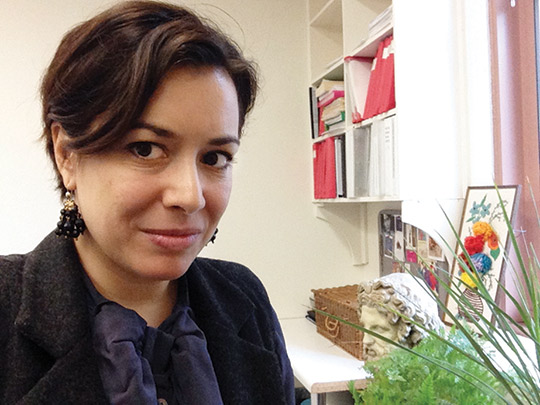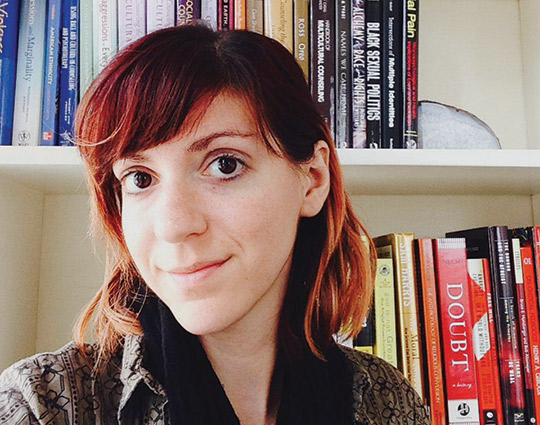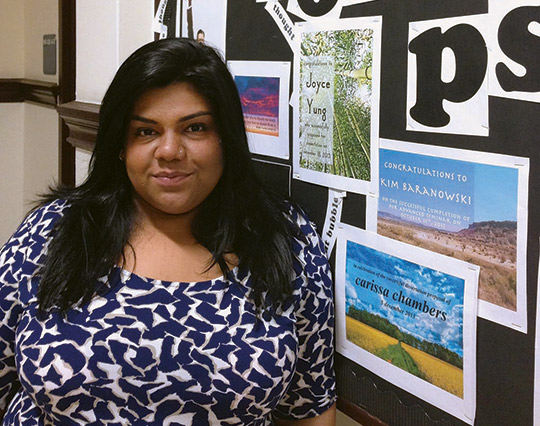Diversity Hits the Books
Course content at TC is changing in response to female and LGBTQ students who ask, -'Where's the stuff about me?'
Course Content at TC is Changing to Reflect Female and LGBTQ Students.
As an undergraduate women’s studies major, Marie Hansen realized that courses in other departments mostly ignored women.
“To learn about women’s psychological development, you had to look in women’s studies,” recalls Hansen, now a TC Counseling and Clinical Psychology master’s student. “Women’s studies is interdisciplinary, so it didn’t go as deep as a psychology course taught by a psychologist.”
Last fall, Hansen took The Mother-Child Matrix, taught by Aurelie Athan, director of TC’s Maternal Psychology Laboratory. Athan is a leader in the fledgling field of “matrescence,” which views the transition to motherhood as a developmental phase like adolescence and other periods of major physical change. Her course is part of a broader initiative, The Sexuality, Women, & Gender Project (SWG), which she and two other psychology faculty members, Assistant Professor Melanie Brewster and Lecturer Riddhi Sandil, created in fall 2012.
“In psychology you usually learn about mothers only insofar as they affect children’s clinical outcomes, but Aurelie flips that paradigm,” Hansen says. “We read articles, mostly from the nursing field. We interviewed mothers. It was exciting, because growing up you see a lot of images that don’t reflect what it feels like to be female. TC is creating a counter-narrative.”
The class also illustrated the real-world impact of consigning work about women to the women’s studies corner. “Eighty-three percent of women become mothers,” Hansen says. “Motherhood is a radical shift in identity. Everyone knows about the baby blues, yet DSM-5 [the diagnostic manual for practicing psychologists and psychiatrists] has no distinguished diagnosis for postpartum depression.”
The SWG Project builds on past efforts at TC to focus on issues of gender and sexuality. In 2010, the year that saw the end of the military’s “Don’t Ask, Don’t Tell” policy and the first wave of state-level decisions to legalize same-sex marriage, TC’s Office of the Provost convened a working group of faculty, students and staff to examine LGBTQ issues (the acronym stands for lesbian, gay, bisexual, transgender and queer or questioning) that affect recruitment, diversity and College life.
In addition, TC’s Office of the Vice President for Diversity and Community Affairs has long been out front on these issues.
“It is particularly heartening that the SWG Project is giving gender and sexuality issues a strong academic focus,” says Janice Robinson, Vice President for Diversity and Community Affairs.
Still, as Sandil puts it, there remained a sense that TC, like most other institutions of higher learning, was “without a sexuality and gender focus,” with the result that “the marginalization of sexual minorities and women had sort of gone by the wayside.”
“There were courses in the 1980s that incorporated women as a focus, but as elsewhere, they’ve gone dormant, perhaps reflecting a desire by women not to be thought of as special anymore,” says Athan, who coordinates the College’s Clinical Psychology program. “And you might say, well, that’s appropriate, because women are now very present in the work force and as students, but I would argue that the conversation isn’t over—that it’s just beginning. We have all these young women now coming into our psychology classes [80 percent of students in the M.A. program are female]. They’re raising their hands and saying: ‘Where’s the stuff about me?’ And we can’t accommodate the demand.”
In 2012, backed by a TC Provost’s Investment Fund Grant, Athan, Brewster and Sandil began working, in Sandil’s words, “to irrigate the disciplines” at TC by combing through the course catalogue and meeting with department heads and other faculty members to discuss ways of integrating an LGBTQ, women and gender focus into a range of offerings. TC is currently on target for a 2015 launch of a certificate program in the understanding of sexuality, women and gender, drawing on course offerings across multiple departments.
Partners in the growing SWG network include Laura Azzarito, Associate Professor of Physical Culture and Education, who is interested in studying women in sports, and Sandra Schmidt, Assistant Professor of Social Studies Education, who teaches about queer spaces and geographies. Enrollment Services Associate Dean Thomas Rock, Marie Miville, Chair of the Counseling and Clinical Psychology Department, and Gregory Payton, a Lecturer in the Department of Counseling & Clinical Psychology, serve on SWG’s executive advisory board.
If women are again sounding a call to be represented as an academic focus, LGBTQ students are perhaps finding their voice for the first time.
“I’ve never been discriminated against at TC, and the environment has always felt accepting, but certain identities aren’t always as celebrated—as though there isn’t as much interest in hearing from a gay person or a transgender person,” says Matt Robinson, a current Counseling & Clinical Psychology doctoral student. Robinson recalls a recent TC class in which “we examined various identities and how they relate to our work in counseling. We talked about our race, religion, culture, ethnicity, and we had to discuss each. And then at the end of the course, we were told we could pick from ‘other identities,’ which included gender and sexual orientation. So, yes, those identities were included, but it’s also an example of how other marginalized identities are more prioritized.”
More recently, that picture is changing. In 2013, Melanie Brewster, who serves as faculty adviser to the student group Queer TC, began teaching a course she calls LGBT(Q) Issues in Psychology and Education, the first such permanent course at the College. Nearly 80 students signed up, forcing Brewster to cap enrollment at 55 this spring. The course has featured a guest appearance by Charles Silverstein, author of The Joy of Gay Sex and a leader of the successful effort to remove homosexuality from the DSM, and a screening of the soon-to-be-released documentary, Pier Kids: The Life, about homeless LGBTQ youth living near New York City’s Christopher Street Piers.
“These are issues that not only future psychologists but also pre-service teachers need to know about in order to work with kids and their parents,” Brewster says.
Alysa Turkowitz (Ed.D. ’12, M.A. ’01), Adjunct Assistant Professor in the Psychology & Education program, says that most LGBTQ students remain “hypersensitive in the classroom—their antennae are up to determine ‘is this a safe space?’” Even something as seemingly innocuous as a verbal math problem that includes the phrase “a husband and wife” can be a major cue.
“Someone who doesn’t fit into that heterosexist dynamic feels excluded, and they may shut down from engaging in classroom dynamics,” says Turkowitz, who wrote her TC dissertation on the LGB experience in graduate school. “Because another question for LGB students in almost any classroom discussion is, ‘Should I come out here, and if I do, what will happen?’ Some feel a responsibility to teach about LGB perspectives, and they’ll come out in every scenario. But others will make that decision case by case, and some believe that being gay has nothing to do with what goes on in the classroom.”
If conflict and stress exist for LGB students, it is even greater for those who are transgender.
“TC is a relatively safe institution, but for transgender students everywhere, there is always a fear of possible violence and retaliation,” says Turkowitz, who two years ago was invited to teach a TC course on the transgender experience that may be one of the few such standing offerings at the graduate school level. “And emotional safety is an even bigger issue.”
In her course, which she describes as “a 101 introduction to transgender experiences,” Turkowitz begins by clarifying what “transgender” actually means (the term does not, for example, refer to sexual orientation, but rather to a sense that one’s gender identity does not conform to one’s sex assigned at birth). She brings in a range of guest speakers, including transgender individuals, lawyers and advocates; covers the mental health field’s view of transgender people (in 2012, the American Psychological Association ceased categorizing transgender identity as a mental disorder); and deals with legal and education concerns.
The work of the Sexuality, Women, & Gender Project is just beginning. Still, it seems clear that a process has started that will not be stopped or reversed—and that the conversation is striking a tone that makes everyone feel included.
“We’re prioritizing and centralizing these issues now in a way that wasn’t happening in the past,” says Brewster. “Even just having faculty like me who are available to do mentoring work is a big step, because students are hungry to have people they can pop in on and talk to.”
Davidella Floyd, a doctoral student who leads Queer TC and serves on the Provost’s working group, agrees.
“It comes down to building the tent big enough: feminist issues, women’s issues, LGBTQ issues, issues of masculinity,” says Floyd, “And what I love is that there’s room in the agenda for the focus to shift, for it to grow and be transformed based on the big issues on the horizon that need to be addressed. That’s a great position to be in.”
Making TC a Place Where People Can Be Themselves
“We’ve got such a shift happening in society in beliefs and perspectives on LGBTQ issues,” says Thomas P. Rock, Associate Dean for Enrollment Services. “TC is placing so many people in K–12 and beyond who can make a difference.”
Rock’s office has been working with the Point Foundation, which offers funding and mentorship to promising LGBTQ students, to increase the College’s visibility and recruit scholarship recipients. TC also has taken part in events such as the Human Rights Campaign’s 2013 leadership summit for historically black colleges and universities, which works to develop current and future LGBTQ leaders at these institutions.
A new LGBTQ Scholarship has been created through a collaboration between TC and the Tyler Clementi Foundation. The TC-funded scholarship will be awarded to two students at the College who are focused on research and practice in LGBTQ issues. Clementi was the young Rutgers student who committed suicide after his roommate secretly videotaped him kissing another man and posted the clip on the Internet. Clementi’s mother, Jane Clementi, spoke last fall at the TC forum “From Bullying to the Defense of Marriage Act: A Journey toward Full LGBTQ Equality,” hosted by TC’s Office of the Vice President for Diversity and Community Affairs. The Office is a vital force at the College for change on gender and sexuality issues, incorporating sessions on microaggressions into TC’s faculty and employee orientation and conducting training for faculty and staff who designate their offices as safe zones for LGBTQ persons.
“The safe zones create an opportunity for people to be themselves,” says Janice Robinson, Vice President for Diversity and Community Affairs.
—Siddhartha Mitter & Joe Levine
(Published 6/3/2014)
Published Tuesday, Jun. 3, 2014



